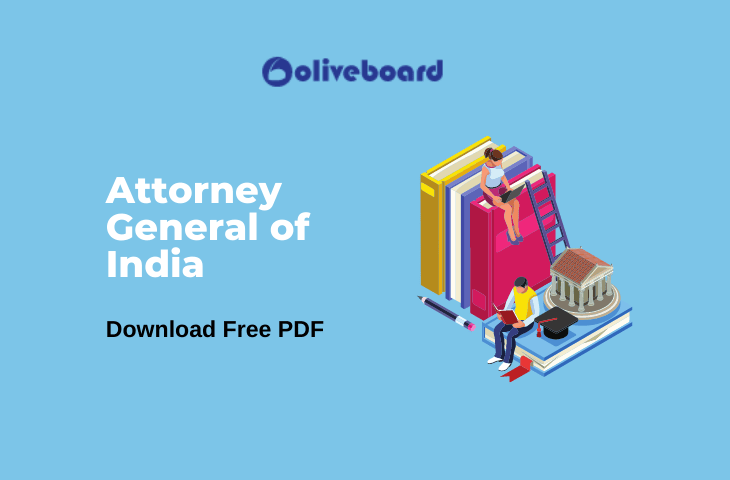Article 76 of the constitution mentions that the Attorney General is the highest
law officer of India. As a chief legal advisor to the government of India, he
advises the union government on all legal matters. Questions on the Attorney General of India are commonly asked in different SSC, Railway & other government exams. Get complete study notes on the Attorney General of India I this blog.
Attorney General of India
Attorney General of India:
Article 76 of the constitution mentions that the Attorney General is the highest law officer of India. As a chief legal advisor to the government of India, he advises the union government on all legal matters.
He represents the Government of India as a lawyer in the Supreme Court of India. The Attorney General, like an Advocate General of a State, is not supposed to be a political appointee, in spirit, but this is not the case in practice.
Appointment of Attorney General:
The Attorney General of India is appointed by the President of India. Following are the qualifications for a person to be appointed as an Attorney General.
⮚ He must be a citizen of India.
⮚ He must have either completed five (05) years in the High Court of any Indian state as a judge or ten (10) years in the High court as an advocate.
⮚ He should be an eminent jurist in the eye of the President.
Term of Office:
⮚ The term of Office of AGI is not fixed, and the constitution does not contain the procedure and ground of his removal.
Here are some important facts about the Attorney general of India:
⮚ He / She holds office during the pleasure of the President.
⮚ He may be removed by the President at any time.
⮚ He can also quit from the office by submitting his resignation to the President of India.
⮚ His remuneration is not fixed by the Constitution.
Duties and responsibilities of AGI:
⮚ Advise the government of India on legal matters that are referred to him by the President.
⮚ To appear on the behalf of the Government of India in all cases in the
Supreme Court of India.
⮚ To appear in any high court in a case in which the Government of India is concerned.
Rights of Attorney General of India:
⮚ He has the right to an audience in all courts in the territory of India.
⮚ He has the right to speak and take part in the proceedings of both the houses of the Parliament or in the joint sessions of parliament (But he can’t vote on any matter in any house of the parliament).
Limitation on Attorney General of India:
⮚ He should not hold or advise a brief against the government of India.
⮚ He should not defend an accused person in criminal prosecution without permission from the government of India.
⮚ He should not accept an appointment as a director in any cooperation without the permission of the government of India.
Here is the complete list of Attorney Generals of India:
| Attorney general of India | Name of Attorney general of India | Tenure |
| 1st Attorney General | M.C. Setalvad | 28 January 1950 – 1 March 1963 |
| 2nd Attorney General | C.K. Daftari | 2 March 1963 – 30 October 1968 |
| 3rd Attorney General | Niren de | 1 November 1968 – 31 March 1977 |
| 4th Attorney General | S.V. Gupte | 1 April 1977 – 8 August 1979 |
| 5th Attorney General | L.N. Sinha | 9 August 1979 – 8 August 1983 |
| 6th Attorney General | K. Parasaran | 9 August 1983 – 8 December 1989 |
| 7th Attorney General | Soli Sorabjee | 9 December 1989 – 2 December 1990 |
| 8th Attorney General | J. Ramaswamy | 3 December 1990 – November 23 1992 |
| 9th Attorney General | Milon K. Banerji | 21 November 1992 – 8 July 1996 |
| 10th Attorney General | Ashok Desai | 9 July 1996 – 6 April 1998 |
| 11th Attorney General | Soli Sorabjee | 7 April 1998 – 4 June 2004 |
| 12th Attorney General | Milon K. Banerjee | 5 June 2004 – 7 June 2009 |
| 13th Attorney General | Goolam Essaji Vahanvati | 8 June 2009 – 11 June 2014 |
| 14th Attorney General | Mukul Rohatgi | 12 June 2014 – 30 June 2017 |
| 15th Attorney General | K.K. Venugopal | 30 June 2017 till date |
Source: https://main.sci.gov.in/constitution
Sample Question:
Question: Who Appoints the Attorney General of India?
A. President
B. Parliament
C. Chief Justice of India
D. Prime Minister
Answer: The correct answer is President.
Question: Who is the highest law officer in India?
A. Chief Justice of India
B. Attorney general of India
C. Advocate General
D. CAG
Answer: The correct answer is Attorney general of India
Question: Who was the first Attorney General of India?
A. M.C Setalvad
B. Niren de
C. S.V. Gupte
D. L.N Sinha Answer: The correct answer is M.C. Setalvad
Download the above blog in ebook format. Click on the below download button:
How To Download The Free e-book?
Step 1: Click on the above-given download link. You will be taken to Oliveboard’s FREE E-Books Page.

Step 2: Register/Login on to the Free E-Books Page of Oliveboard (It is 100% free, You just enter your valid email ID and a password to be able to download the Attorney General of India Free ebook.
Step 3: After Logging in, you will be able to download the free e-book.
Ebooks
You can download 200+ ebooks important for SSC, Banking, Railway, Insurance, and other government exams here.
Oliveboard Bolt series E-books:

